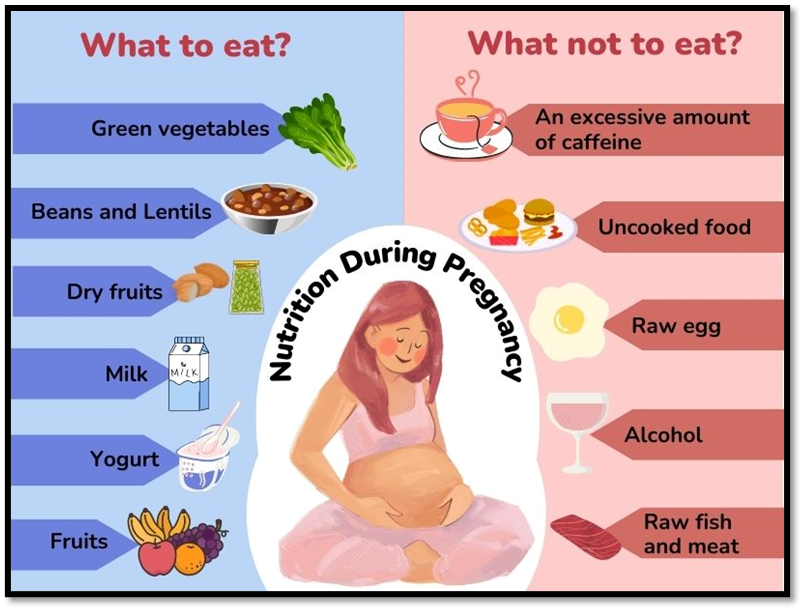The Impact on Health and Development of Food Choices During Pre-Pregnancy, Pregnancy, and Breastfeeding
Nutrition has a vital role in the health and growth of together the mother and child during the stages of pre-pregnancy, pregnancy, and lactation. Appropriate diet before conception encourages fertility, brands the body for a healthy pregnancy, and reduces the risk of difficulties. During pregnancy, decent diet benefits maternal health and fetal growth, reducing diseases like gestational diabetes and subsidiary usual development. Breastfeeding mothers require progressive nutritional intake to reservation their health and suggestion critical nutrients for their babies, permitting optimal development and development.
Proper
nutrition before conception is vital for ornamental fertility, preparing the
body for a healthy pregnancy, and dropping the chance of problems. A
nutrient-rich diet recovers reproductive health by regulating menstrual periods
and increasing egg quality
Folic Acid: This B
vitamin is significant for DNA synthesis and cell division. Adequate folic acid
intake beforehand conception reduces neuronal tube abnormalities in the
developing embryo, which occur initial in pregnancy, frequently before a woman
knows she is pregnant.
Iron: Iron
ensures a healthy blood supply, crucial for avoiding anemia, a disorder that
can influence both fertility and pregnancy consequences. Adequate iron levels
assist sustain a healthy oxygen supply to reproductive organs, encouraging
overall reproductive health.
Omega-3 Fatty Acids: These
essential lipids are essential for brain health and growth. Omega-3 fatty
acids, particularly DHA, are perilous for the health of the eggs and early
fetal growth.
Proper
diet also prepares the body to handle the augmented demands of pregnancy,
minimizing the risk of difficulties such as gestational diabetes and
preeclampsia.
A healthy
diet is energetic for women planning to conceive. This includes a range of
fruits, vegetables, entire grains, lean meats, and healthy fats. Such a diet carries
a extensive range of critical vitamins, minerals, and other nutrients essential
for good health and fertility.
Fruits and Vegetables: These are
rich in vitamins, minerals, and antioxidants that support complete health and
reproductive function.
Whole Grains: Whole
grains provide continued energy and essential nutrients like B vitamins and
fiber, which help preserve a healthy digestive system.
Lean Proteins: Bases
such as poultry, fish, beans, and nuts deliver the amino acids necessary for
tissue repair and development.
Healthy Fats: Foods
like avocados, nuts, and olive oil provide vital fatty acids that provision
hormonal balance and reproductive health.
Nutrition During Pregnancy
During
pregnancy, an additional 300 calories per day are required to sustain the
growing fetus and suitable nutrition is crucial to promote maternal health and
fetal development
Folic Acid: Continues
to be crucial for averting neural tube defects in the developing fetus.
Adequate intake is significant in the early stages of pregnancy.
Iron: Supports
the increased blood supply desirable for both the mother and the emerging
foetus. Iron deficiency during pregnancy can lead to anemia, compromising together
mother and fetal health.
Calcium: Essential
for the growth of fetal bones and teeth. It also plays a role in influence
function and nerve transmission for together mother and baby.
Vitamin D:
Facilitates calcium absorption and provisions bone health. Adequate vitamin D
is necessary for proper bone growth in the fetus.
Protein: Important
for fetal tissue development and development. Protein needs increase during
pregnancy to provision the growth of the placenta and fetal tissues.
DHA (Omega-3 Fatty Acids): Critical
for the growth of the fetal brain and eyes. DHA supports neurological growth
and visual acuity.
Healthy Eating Patterns: Pregnant
women should aim for balanced meals that comprise a variety of foods from all
food groups. Recurrent, small meals can help manage nausea and preserve stable
blood sugar levels.
Maternal Health: Adequate
nutrition through pregnancy minimizes the risk of difficulties such as
gestational diabetes, preeclampsia, and maternal anemia. It helps overall
maternal health, provided that the mother receives the energy and nutrition
needed to withstand a healthy pregnancy.
Fetal Development: Proper
nutrition supports best fetal growth and development. It reduces the risk of
birth flaws and enhances fetal brain development, safeguarding the baby's
long-term health and well-being.
Importance of Monitoring: Even
prenatal checkups with healthcare providers are essential to monitor mother and
fetal health, examine nutritional status, and brand adjustments to the diet or
supplements as desirable. By addressing nutrition throughout pregnancy, women
can growth their personal health and encourage the best possible outcomes for
their offspring.
Nutrition During
Breastfeeding
Breastfeeding
mothers have augmented nutritional needs to support together their own health
and the production of breast milk. Key nutrients include:
Caloric Intake: Lactating
mothers require an additional 500 calories per day likened to their
pre-pregnancy needs to provision milk production and maternal energy
expenditure.
Hydration: Adequate
fluid intake is vital to maintain milk supply. Lactating mothers should drink
plenty of water and other liquids through the day.
Calcium: Necessary
for maintaining maternal bone health and subsidiary the growth of the baby's
bones and teeth.
Vitamin D: Essential
for proper bone growth in the infant, as breast milk may not offer adequate
levels alone.
Vitamin B12: Crucial
for the baby’s brain growth and nervous system function.
Iodine: Supports
the baby’s thyroid function and general growth, crucial for brain growth.
Omega-3 Fatty Acids (DHA): Significant for infant brain and eye
growth, contributing to cognitive function.
Maternal Health: Proper
diet while nursing helps mothers continue energy levels, recuperate from
childbirth, and provision general health. Adequate nutritional ingesting also
minimizes the incidence of postpartum despair and improves hormonal balance.
Infant Development: Breast
milk is rich in significant nutrients, antibodies, and enzymes that protect
against contagions and allergies. It provides appropriate food for the baby's
growth, immune function, and cognitive growth during the first six months of
life.
Dietary Considerations: Lactating
women should focus on a balanced diet that comprises a diversity of
nutrient-dense foods such as lean proteins, whole grains, fruits, and
vegetables. Numeration sources of omega-3 fatty acids, like fatty fish, can
boost the nutritious fineness of breast milk.
Consultation with Healthcare
Providers: Referring by a healthcare physician or a lactation consultant can protection
that nursing mothers are attaining their nutritional needs. They can offer references
on dietary alterations, additions, and nursing strategies to promote composed
mother and newborn health.






Comments
Post a Comment